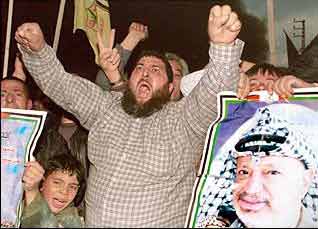| BEIRUT, THE LEBANESE
CAPITAL was relatively quiet as Muslims and Christians observed religious
holidays. But in the coffee shops, all eyes were glued to the images beamed
in from Al-Jazeera satellite television and other Middle East satellite
channels from Ramallah. The images documented Israel’s sweeping military
offensive into the West Bank, striking the heart of the Palestinian Authority
by seizing Arafat’s compound and restricting him to one floor of the building.
The dramatic pictures underscored
the perception that Israel is intent on crushing the Palestinian Authority.
Arafat had said he was willing to accept martyrdom rather than risk capture
by Israeli forces.
Raanan Gissin, a spokesman
for Prime Minister Ariel Sharon, described Arafat’s fears as “nonsense,”
saying Israel had no intention of harming the Palestinian leader.
RAGE ACROSS THE REGION
Nevertheless, Arab anger
could be felt across the region.
At entrances to the Ein el-Hilweh
refugee camp in south Lebanon, Palestinians burned tires in protest. A
general strike closed shops and schools, and thousands of angry Palestinians
shouted anti-Israel slogans and waved Palestinian flags.
In Jordan — one of three
Arab countries that has diplomatic ties with Israel — Palestinian refugees
in two camps near Amman called for holy war and for removal of the Israeli
ambassador. Riot police threw tear gas canisters at hundreds of protesters
at one camp.
WARNING FROM JORDAN
King Abdullah II of Jordan
accused Israel of escalating the violence and threatening Arafat’s life,
and said the Jewish state had violated all international conventions, the
official Jordanian news agency reported.
Jordan on Saturday warned
Israel not to harm Arafat, saying its assault on his base threatened to
end hopes of Arab-Israeli peace.
“Jordan warns Israel any
harm to the person of President Yasser Arafat, the symbol of the Palestinian
people and its elected head and the continued occupation and aggression
will have dire consequences on Israel,” Minister of State Mohammad al-Adwan
said.
Jordan said the attack on
Arafat’s Ramallah headquarters was quickly pushing the region back to an
“atmosphere of war” that threatened to engulf the Middle East in more violence.
“This will eliminate any
hope of peace and will not bring security to Israel,” said Adwan, official
overnment spokesman.
It “restores the region to
an atmosphere of war at a time when the Arab nation is presenting its most
important peace proposal with Arab consensus to end the Arab-Israeli conflict.”
DEMONSTRATION IN BEIRUT
In Beirut, between 500 and
1,000 demonstrators representing different Palestinian factions, gathered
downtown to peacefully demonstrate against Israel’s incursion.
There was anger and also
a sense of frustration about being unable to stop the strike in the West
Bank. Instead, the demonstrators called on the international community
to take action.
Officials were equally irate.
“Hours after the Arab peace initiative was issued from the Beirut summit,
Israel replied with a barbaric war, and a flagrant and brutal aggression,”
Lebanese President Emile Lahoud said.
Lahoud led the Arab League
summit in Beirut that ended Thursday with Arab nations offering Israel
peace and normal relations in exchange for a withdrawal from territory
it seized in 1967 and other concessions.
Saudi Crown Prince Abdullah,
the architect of the peace plan, said he had received assurances from the
United States that Arafat would not be harmed.
But he blasted Israel’s attack
on Arafat’s compound and said it was an example of Israeli oppression that
breeds suicide bombers like the ones who killed two people in Jerusalem
on Friday.
“What is happening is a savage,
despicable act, an inhuman and cruel act. I don’t think any human being
can accept this at all,” he said. “What [Israeli Prime Minister Ariel]
Sharon is doing makes people ... do these things.”
A DAY MAKES A DIFFERENCE
On Thursday, the meeting
of the Arab League seemed to pull together after a disastrous opening day
when the Palestinian delegation walked out over what it said was a deliberate
snub of Arafat by the Lebanese government.
The Palestinians asserted
that Lahoud conspired to prevent the Palestinian leader from addressing
the meeting by satellite link from his Ramallah offices.
On Thursday, representatives
of 22 Arab countries, including 10 heads of state, unanimously backed a
Saudi proposal that offered “normal relations” in exchange for an Israeli
pullback from territories captured after the 1967 war.
Even though Israel has insisted
a complete withdrawal would compromise its security, the reaction on the
streets here was positive: The league’s members, frequently at odds with
one another, had united behind a plan for peace.
Even though it was only a
first step, it was welcomed by the Arab public. But on Friday, the sense
was that Israel had ignored the proposal, instead focusing on a military
solution.
On a more practical level,
Arab leaders are not expecting immediate progress. Some experts said the
proposal was directed at the peace camp in Israel, and Arabs don’t consider
Sharon a member of that camp.

|
